How Many People Are Applying for Philosophy Jobs? (guest post)
How many people are applying for academic jobs in philosophy? There have been some efforts underway to collect this information, and among them was a survey sent out by Charles Lassiter (Gonzaga) to search committees.
In the following guest post*, Professor Lassiter shares what he has learned. (A version of this post first appeared at his site.)

[Gerhard Richter, “4096 Colores” (detail)]
How Many People Are Applying for Philosophy Jobs?
by Charles Lassiter
One of the more challenging questions to figure out is how many people are applying for academic jobs. The NSF’s Survey of Earned Doctorates puts the number of new philosophy PhD’s per year at ~450. But people are on the market multiple times and not everyone who gets a PhD applies for academic jobs. So how many people are applying for jobs? I sent out a survey to heads of search committees to begin figuring it out.
But first: gratitude. Nathan Ballantyne, Julianne Chung, Maria Howard, Greta Turnbull, Joe Vukov, Tim Weidel, and Shane Wilkins provided feedback on the survey and gave suggestions for thinking about the data. Our department’s work study Kate Kellen collected emails from PhilJobs—thank you Kate! She’s graduating this year; so if you have a side gig and you need someone for data entry and similar tasks, drop Kate a line.
I sent out around 200 emails and 70 surveys were completed. Thank you to everyone for filling out the survey. I originally was going to hold off until February because there are still some deadlines that haven’t passed, but I’ll update these numbers as more data roll in.
The survey was brief: how many applicants, AOS (using PhilJobs’ categories), job expectations, rank, and reaction to number of people who applied. Here’s what I found:
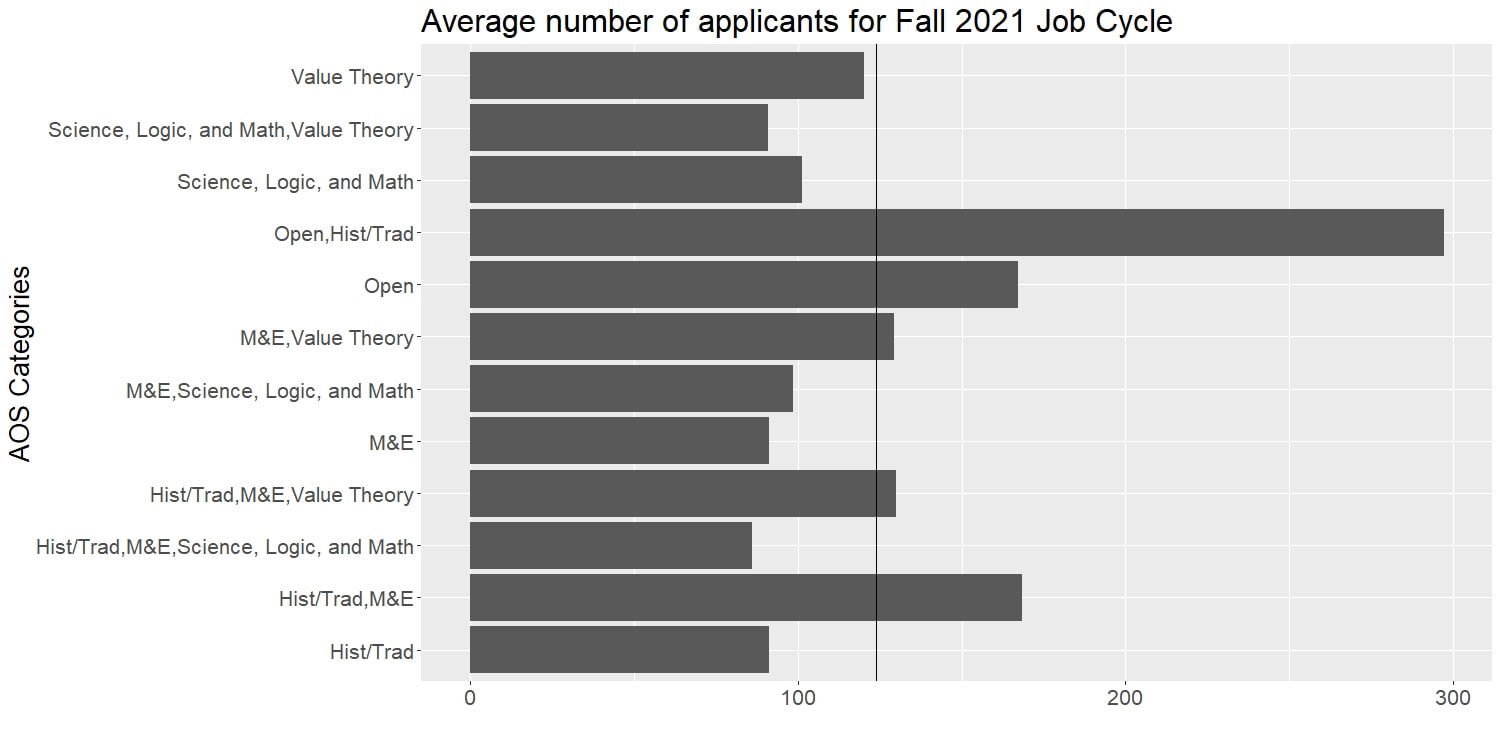
Because respondents were able to choose more than one AOS, we have a variety of overlapping categories. The vertical line is the average number of applicants across all categories, which is 124. (BTW carving the data this way, there wasn’t a big difference between mean and median.)
What are the upper and lower bounds? The point is the average for each AOS grouping.
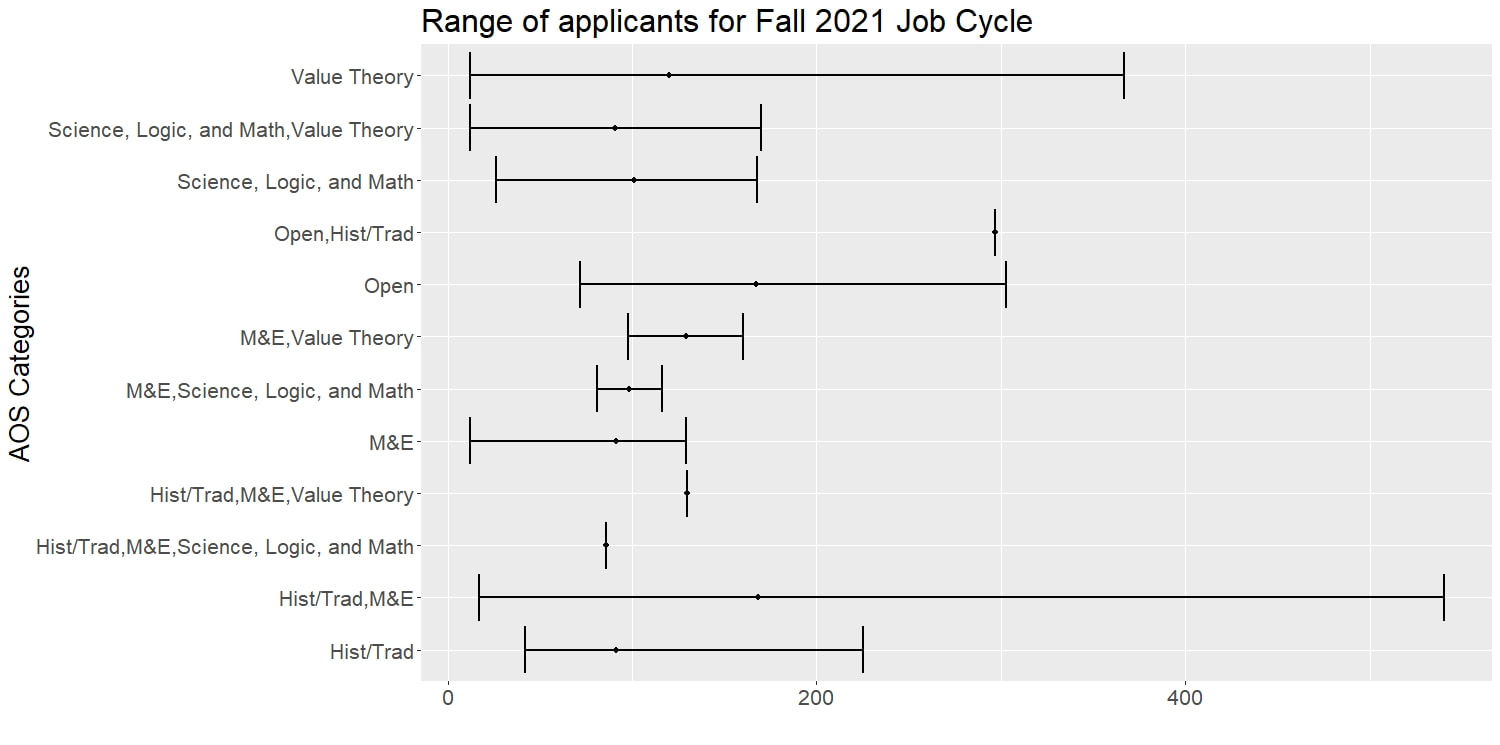
Now let’s do it for rank. Since there were some sizable differences in some categories between the mean and median carving up the data this way, I’ve included both. Compare, for instance, open rank average and median. (This is explained by an outlier of 524 applications!)
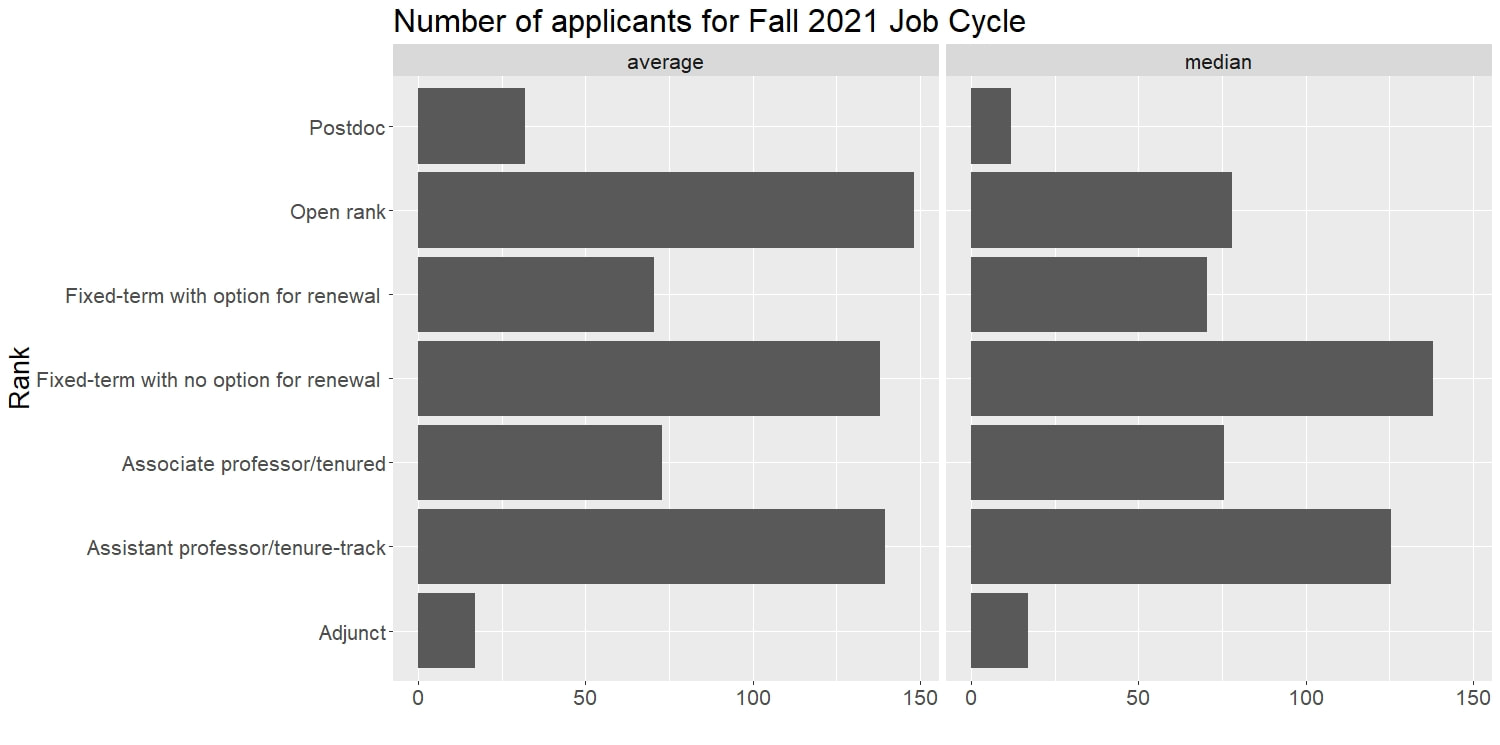
Now let’s look at ranges by rank. The point is the median because outliers had a bigger effect in some categories carving the data this way.
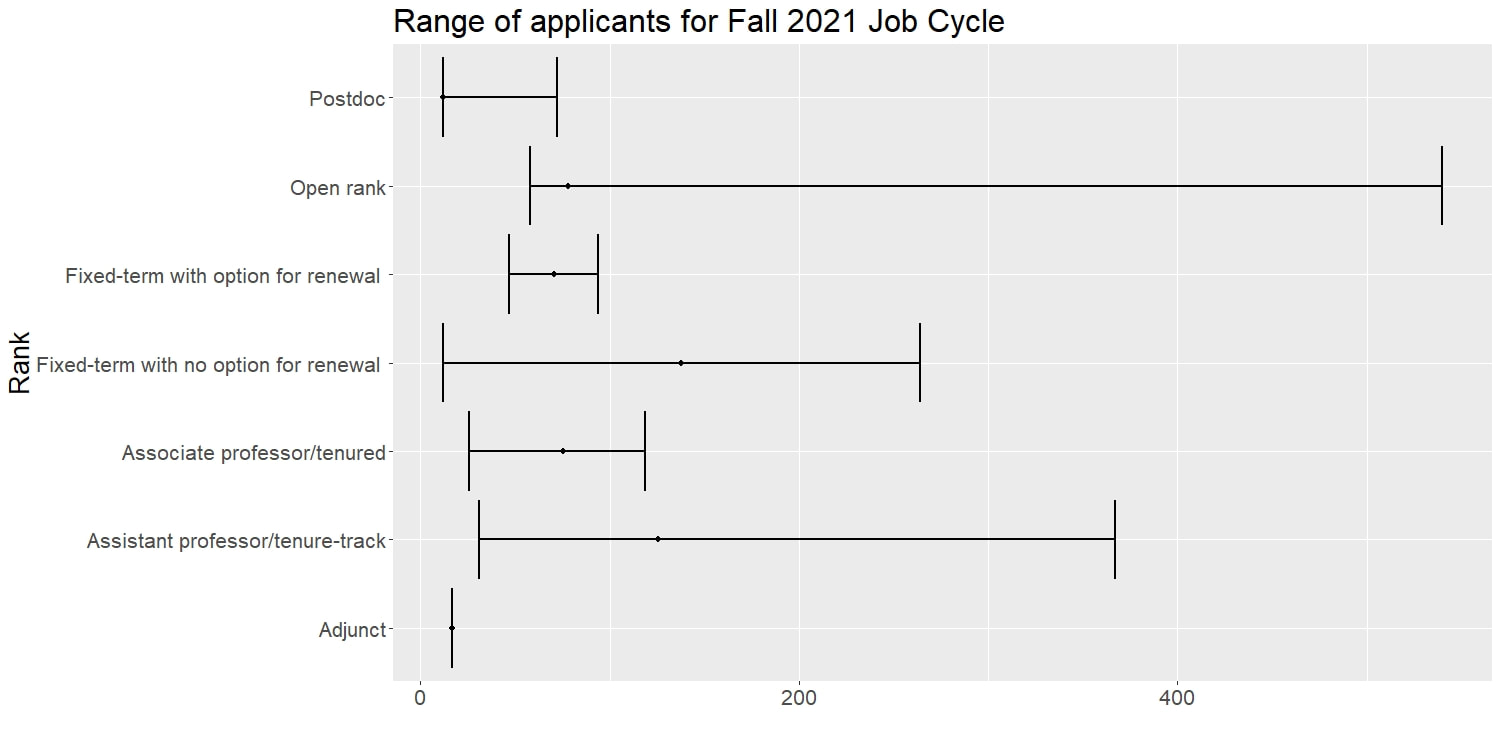
Here’s a heatmap crossing AOS with Rank. The lighter the color, the greater the average number of applicants. No color means that there weren’t any data for that combination (e.g. Postdoc and Hist/Trad).
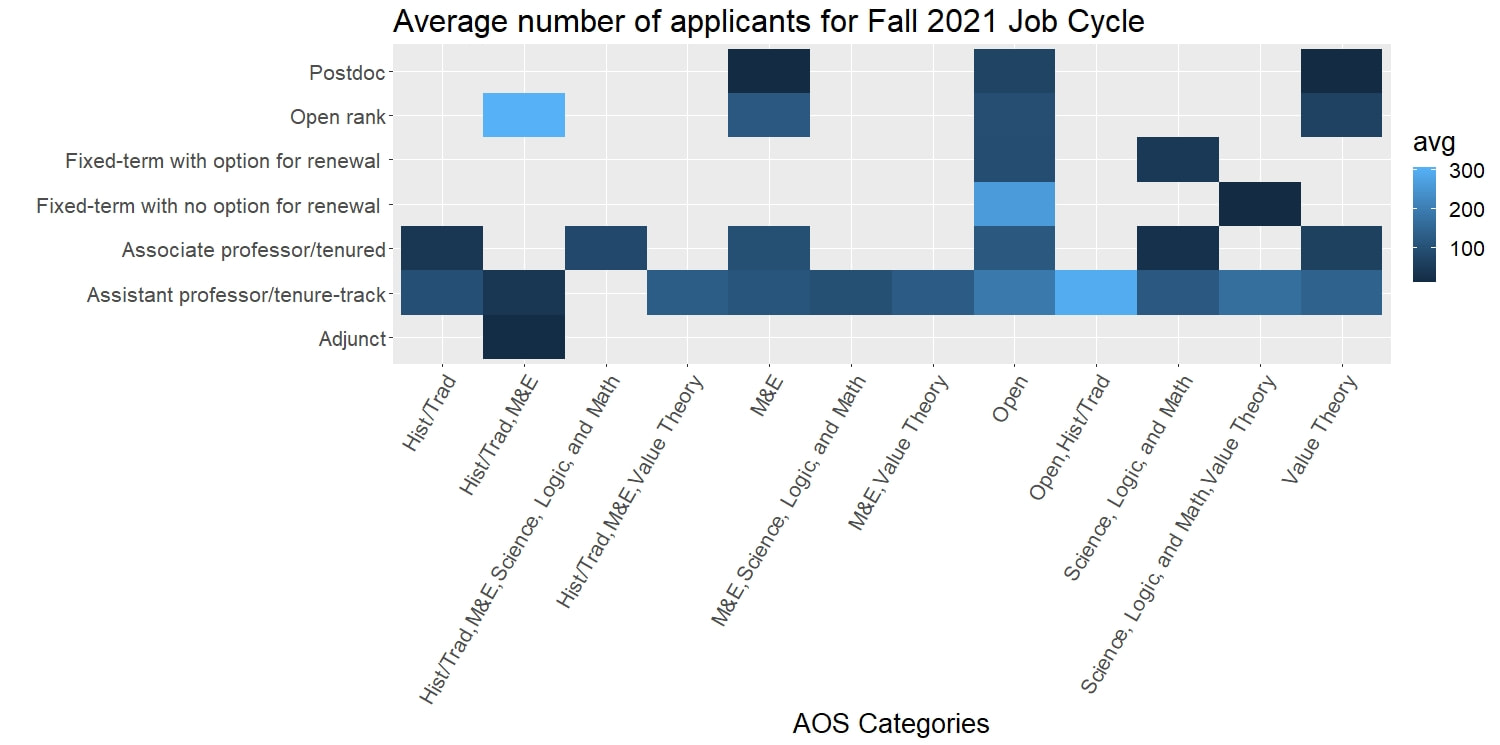
Finally, let’s look at number of applicants by job expectations and rank
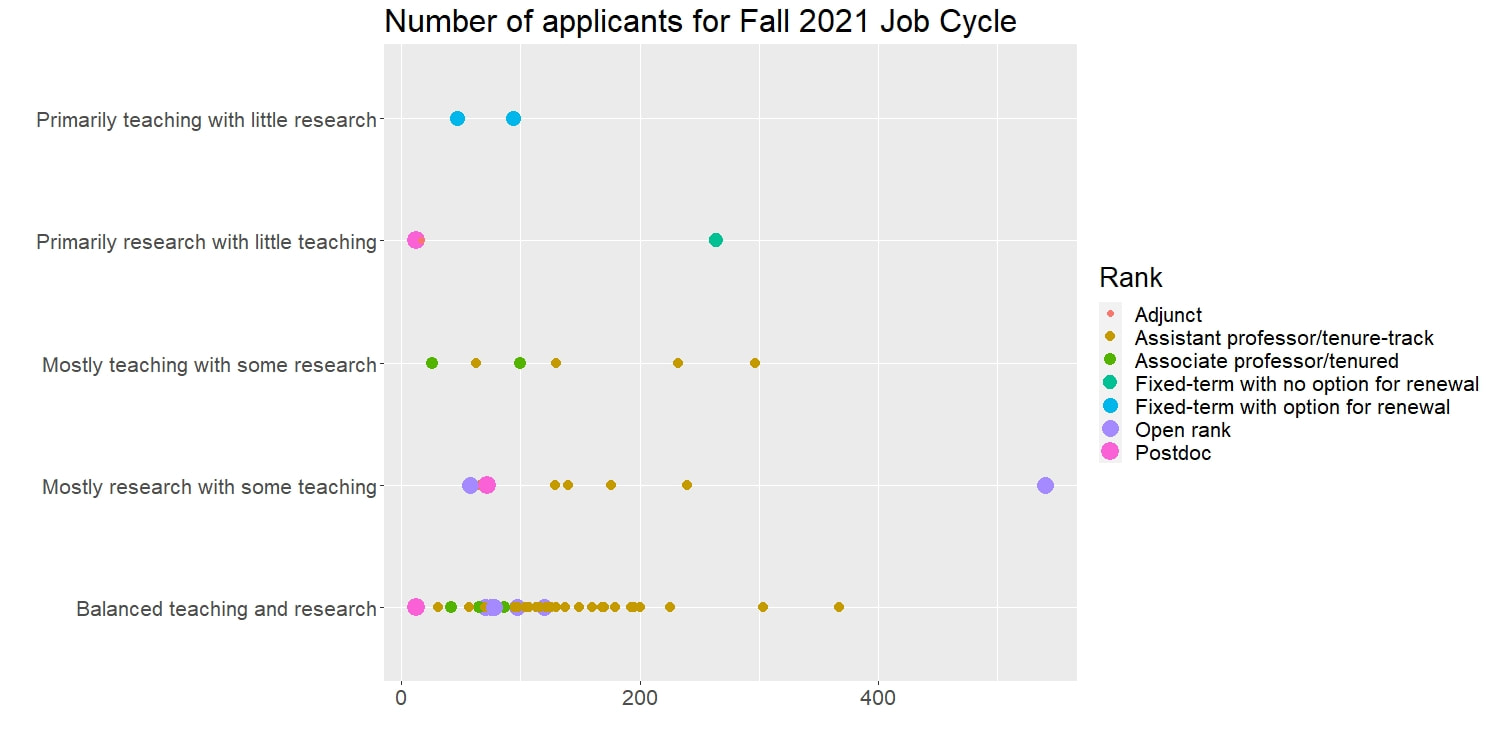
There are the data. What are the takeaways? First, I was expecting upwards of 300 applicants for open AOS, but it’s about 175 (including open combined with other areas). If we filter for open AOS and TT, then the number of applicants goes up to 200. Second, it doesn’t seem like applicants discriminate much between TT and fixed-term jobs: there are about as many applications for TT jobs as fixed-term without renewal jobs. This makes sense: philosophers gotta pay the rent, if only for a year. Finally, it looks like a job with balanced teaching and research demands had more applicants than straight research gigs. This is fascinating. It seems like, contra received wisdom, people aren’t holding out for cushy research gigs. If we’re judging by numbers of applicants, having a mostly research job isn’t the ideal for many young philosophers, contra the received wisdom.
The question to my mind is, why are there so few applicants? Don’t get me wrong—200 on average is a lot of people. But I expected there to be much more given the awful market last year. Consider the following graph of junior job ads:
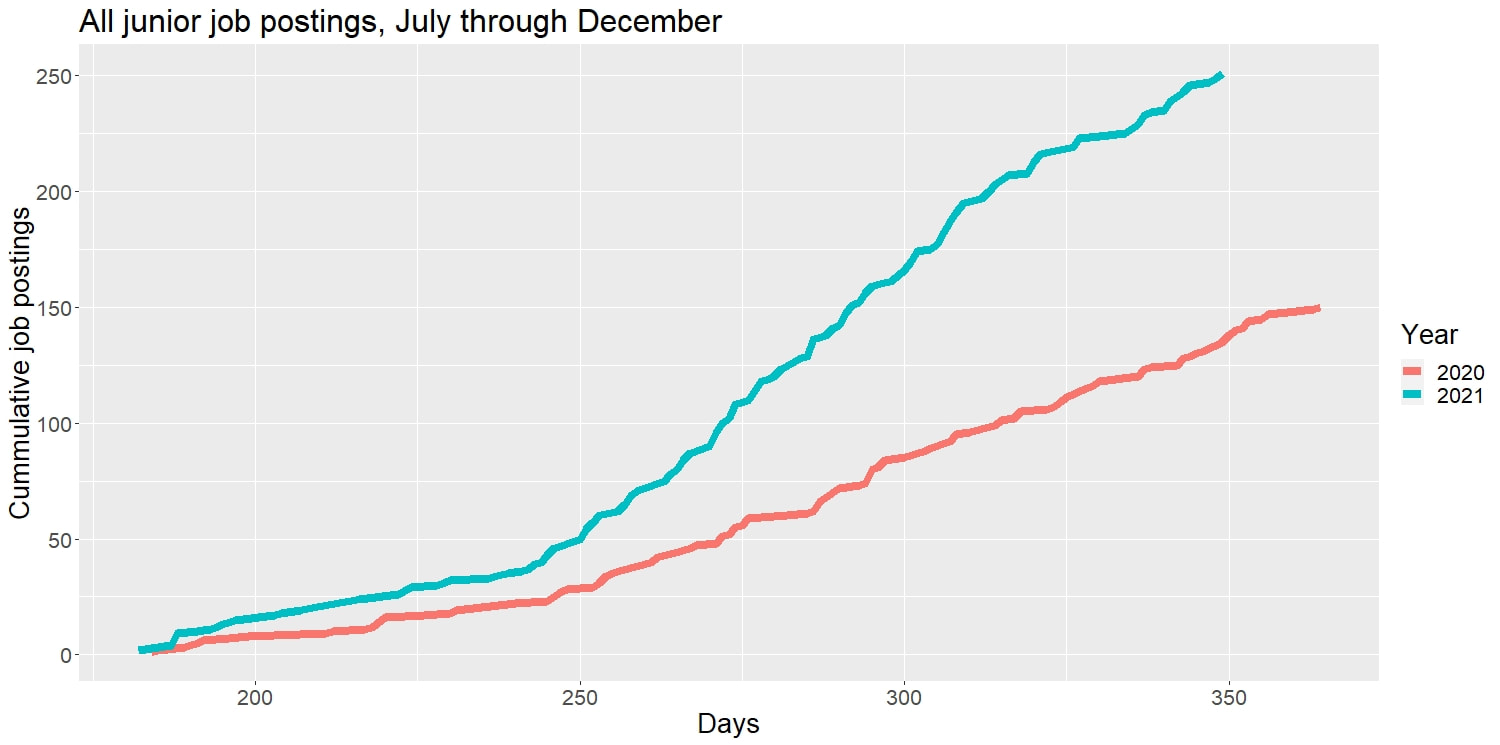
There were nearly 250 junior job ads posted this cycle. (I added 2020 to remind us of how many fewer jobs were advertised last year.) The highest value for an open AOS TT position was 303 and for value theory it was 367. So obviously there are more applicants than there are jobs. The discrepancy here is interesting: there are some folks who applied for value theory TT jobs who didn’t apply for open AOS jobs. So using open AOS as a proxy for number of people on the market comes with some caveats.
It looks like people are being selective in which jobs they apply for, which of course makes sense. I guess I didn’t imagine how selective people were being. The only job I passed on when I was on the market was one in Kazakhstan, and that was at the request of my spouse. But maybe that’s just my desperation. Also, there might be a selection bias in the responses. I sent out emails to the names listed on job ads whose deadlines for applying had passed by Dec 1. Maybe positions with higher numbers of applicants didn’t complete the survey.
I’m interested in hearing from people who passed on applying this year or didn’t apply for some jobs rather than others. If you have a moment, please post (named or pseudonymously) in the comments.
That’s all. If you can think of other analyses you’d like to see, please contact me at [email protected] . Thanks for reading!



Sometimes open AOS’s are open only in the title, but in the ad they say “we are especially looking for X, Y, or Z”. If I don’t work on those things I don’t usually apply. I also don’t apply for any that I don’t see myself having at least a minimal chance of getting.
Also, beggars can’t be choosers, but at least some of us think we aren’t really beggars. At least I have a temporary research gig now for a couple more years, so I’m less desperate than I’ll be next year or especially the year after. I only applied for jobs that I thought I would be very happy at, including the town I would need to live in. I also have some friends for whom location is very important, and they would rather leave academia than having to go somewhere they don’t want to — so they are also selective in their applications. And perhaps there are more people like this than we tend to realize, which may also explain some of the numbers.
“Finally, it looks like a job with balanced teaching and research demands had more applicants than straight research gigs. This is fascinating. It seems like, contra received wisdom, people aren’t holding out for cushy research gigs. If we’re judging by numbers of applicants, having a mostly research job isn’t the ideal for many young philosophers, contra the received wisdom.”
I find that totally odd. Perhaps many research focused jobs are within externally funded projects and that comes with very specific requirements. It is way more likely to attract many applicants for a job in philosophy of mind or ethics than for “project concerning the olfactory perception”.
That explanation might be right, but this could also be a reflection of the broader post-pandemic re-evaluation of careers and work/life balance we’re seeing across the economy.
From what I can tell, the received wisdom that people want research jobs is really more a reflection of the job market’s incentive structure than of people’s actual preferences. I know plenty of people who love philosophy and teaching, but who find the research grind stressful and disheartening. So perhaps the opportunity to reevaluate their careers has led many people to question the received wisdom and conclude that they would actually prefer a more teaching focused job despite the incentives.
I would think that the lower number of applicants for mostly-research jobs are better explained by a correlation between mostly-research and elite-ness (in terms of the percentage of applicants for whom getting an offer is predictably unrealistic). The most elite jobs should be expected to get fewer applications because those jobs are easier for non-elite potential applicants to identify as being unrealistic and not worth bothering with (or a more complicated variant of this in which non-elite potential applicants apply to a few of their very most ideal jobs despite those jobs being highly elite but generally, high elite-ness reducing applications, i.e., “I’ll apply to that NYU job because it is the absolute ideal for me but I’m not going to bother with the Princeton app”). This would persist even if the amount of research in the job correlated perfectly with ideal-ness. An extreme version of this would be a shelf-stacking job at Home Depot getting more applications than the Yankees’ General Manager job; that wouldn’t suggest that applicants consider the former closer to the ideal than the latter.
While I think there is general consensus that application numbers have gone down, I really doubt this is representative of much. (Though I had a lot of trouble understanding the data as presented, so maybe I don’t understand.) One thing that seems relevant: a lot of jobs this year had AOCs that were unusual, or desired teaching areas (e.g. continental for a job that did not have a continental-leaning AOS, non-western) that not many applicants have. It’s unclear how this was or wasn’t incorporated into the data.
Also, you say “a job with balanced teaching and research demands had more applicants than straight research gigs”. This isn’t surprising if the only thing you are counting as a “straight research gig” is a job with no teaching associated with it, since most of those are postdocs, some of which involve complicated applications. It looks like that is what you are doing. The numbers for research-focused tenure track jobs, on the other hand, seem like there is simply not enough data to make these conclusions from. You can see this because the one “open rank” job you have listed on that line has so many more applicants than the tenure track jobs (like multiple times as many!). There are not that many associate and full people applying for jobs–certainly not enough that it would increase the applicant pool from 200 to 600 or whatever–so it seems to me like you don’t have enough data to be making any of these fine-grained assessments/claims. (Presumably what’s happening there is that the open rank job also was open AOS or something like that, whereas the tenure track jobs on that line were not. But that just goes to show that you don’t have enough data to make these assessments, since you’re not controlling for advertised AOS/AOC in this part of the assessment, etc.)
I was on the job market for two years before the pandemic and didn’t do great to put it mildly–two interviews, zero offers. Didn’t apply in 2020 because of the relative lack of jobs, and come 2021, I decided not to apply either because I figured there was a backlog of highly qualified applicants who didn’t get a job in 2020. If I didn’t do great prior to 2020, I concluded I had no chance in 2021, and so I decided to leave academia altogether.
It would be interesting to know whether the pandemic recession / “great resignation” has something to do with lower application numbers this year. A lot of people across the workforce took some time during this disruption to think seriously about what we actually want out of our work life. It’s possible that this increased space for reflection gave more PhDs time to realize that the stresses of academia aren’t worth it to them, especially if they will likely have to move somewhere unattractive and take mediocre temporary jobs for several years in order to do so. I know that this has affected my own applications this year—I’m being much more selective about geographic location and my sense of fit with the department—and if I hadn’t gotten phenomenally lucky on the job market last year, I wouldn’t be applying this year at all.
I’m confused about how you categorized these things. I believe you have data from our job at BU (367 applicants, disjunctive moral/legal/political). I believe you have classified our job as “balanced teaching and research”. But if an R1, PhD granting tenure track job with a fairly standard “research” teaching load (2-2) falls under neither “primarily research with little teaching” nor “mostly research with some teaching” then I’m starting to doubt your classification system and how people will interpret your presentation of this data vs. what you intend. I doubt this is intentional on your part–it is actually true that our job balances teaching and research–but so does almost every other relatively cushy, R1, PhD granting position there is. And those are the positions people are referring to when they talk about “research jobs”.
(Also I should have said: it’s great that someone is compiling this data and I suspect it is useful to job candidates who have heard a lot of doom and gloom about hundreds of people applying to every job. I just have some concerns about the way the data is being presented.)
thanks for the input! I was thinking about asking folks to categorize their depts as R1, R2, SLAC, etc. but there are official Carnegie classifications and informal ones people use and I was worried about folks conflating them. my hunch was Likert-style options would be better? I supposed if folks found themselves at an R1 then they would select “primarily research” or “mostly research”. that’s what makes an R1 an R1, right? I can think more about how to work on this for the future. I appreciate the feedback.
I can’t speak to whether someone from BU filled out the survey. the pessimist in me thought that “number of applicants for a position” could be used as another metric by which to say “dept X is better than dept Y”, which would make me physically ill.
I filled out the survey. We’re an R1 and we evaluate research profiles like an R1 for tenure. We also care about teaching and standard load is 2-2. It’s 40% of the workload. So, I selected balanced teaching and research.
right. I would have selected it too, I suspect! But I think it’s worth clarifying to readers of the presented data that “balanced teaching and research” may (at least sometimes) mean the same thing as what is normally referred to as “research jobs” in discussion about the philosophy job market, e.g. on the philosophers’ cocoon blog and other places where candidates get info about the market.
what interesting insights! i would have guessed R1’s would consistently fall into more research rather than balanced. that aside, a few thoughts:
Point (2) gives me pause. My hunch (though I don’t have the data) is that folks applying to R1s expect more research than teaching. It would be interesting to survey job applicants to see if their expectations line up with departmental expectations. So I’ll qualify my original claim: more folks seem interested in applying for balanced positions, provided there’s a match between applicant and department expectations. Whether there is such a match seems an open question.
In future iterations of this project, adding a question about Carnegie classification (R1, R2, community college, etc) would add useful info.
many thanks for the feedback and participation!
There’s an ambiguity, I think, between “balanced” meaning “the explicit workload is equal split between teaching and research” and meaning “for the purposes of tenure, promotion, and merit, teaching matters as much as research”. Many positions in philosophy at R1s are probably more balanced in the first sense, but deviate a lot with respect to whether they are balanced in the second. It might be useful to survey about expected teaching load for positions.
Hey, Michaela. Yes, full agreement on this (and your initial comment). I missed this when scrolling on mobile.
Remember a few years ago when Boise State (in Boise, ID) sent letters of rejection, saying they’d had ~646 applicants? AOS: Open, think they hired from Rutgers iirc.
Tl;dr: these numbers are way down. Was easily 300+ when I was on the market. That’s progress.
I don’t think the teaching / research data mean what the OP thinks they do.
There are very, very few permanent or indefinitely renewable research-only jobs in philosophy, and essentially none you can apply for at a junior level. Research only jobs are going to be short-term non-renewable postdocs. So I imagine the fact that more people apply for teaching/research jobs than pure research jobs mostly just shows that people like steady employment in a fixed location.
Sorry, that’s me.
Thanks for this. My sense is that if that were true, then you’d also find low application numbers for fixed term positions with no option for renewals. But that’s not what the data show.
This tracks, in a lot of ways, with searches at my (coastal blue state HCOL SLAC) university. We’ve held about a half dozen searches over the last five years and each has had ~130 applicants. Perhaps the only thing my anecdata might suggest is that the trend in applications may be older than is being posited here (i.e., not caused by Covid but possibly only slightly exacerabated by it).
I was on the market post 2008 (roughly 2011-2014) and so everytime we’ve held a search I expected, given our desireable location and relatively modest teaching load, that we would get hundreds of applications. That’s never quite happened and our searches haven’t been super niche either.
I think also there are now SO many jobs now calling for philosophy of race and gender, feminism, etc.. For many who work in more traditional areas, they can’t really say honestly that this is an area of specialization or competence. Although they may sympathize with the goals of diversifying the curriculum etc., this is just not really their main thing and there is no way they will convince a search committee that it is. I suppose people could write dissertations on these things just to get a job, but that doesn’t seem to me a good idea unless one is super interested in the topic.
This is true. Also, there are many jobs calling for data ethics/ethics of AI.
We typically only get around 50 applicants for our open, tenure-track community college positions. It is a little surprising to me. We are in a largish California city with a very reasonable cost-of-living, and the lowest starting salary for someone with a completed Ph.D.–and no teaching experience–is just under $78,000 (3+% annual guaranteed raises). We’ve never had anyone denied tenure, and tenure begins the fifth year of employment.
We’re hiring this year. For me, it is a dream gig, but we never seem to generate a lot of interest (even compared to the California State University in our city that pays less).
Are philosophers really so turned off by a 5-5 load that they’d rather not have a job in philosophy than teach at a community college?
In my case, yes. I’d rather do something else for work than teach a 5:5 load.
Fair enough. This could partially explain why we get relatively few applicants.
If the search is still ongoing, can you provide a link to apply? I just looked through PhilJobs and the CCC registry and couldn’t find the posting.
Cc me,
I’m not sure Justin would want me to turn his blog into a job site. The position posted three days ago and our human resources department still hasn’t distributed it widely. It should be out soon and doesn’t close until March 11, so keep your eyes peeled. A lot of community colleges post to Higher Ed Jobs, and in our case, we have to pressure our HR department to post on PhilJobs.
Justin feel free to edit out the link if it isn’t appropriate:
https://scccd.peopleadmin.com/postings/4065
I suspect that not regularly putting ads on PhilJobs is the main problem, where numbers of applicants are concerned. I trawled six or eight sites looking for jobs, but most applicants just stick to the normal channel(s).
We recently had a search. The department decided to give not to post it to PhilJobs to limit the pool of applicants. That’s exactly what that achieved.
I thought California did away with Loyalty Oaths?
“The successful faculty member will be an equity-minded individual…An equity-minded individual is a person who:
Understands the importance of holding ourselves accountable as educators for closing equity gaps and engaging in equitable practices;
That would certainly be a big turn-off for me. Even if the vague doctrines a school compelled me to accept were generally to my liking, my agreeing to them would give my prospective employer and colleagues a sneaky way of trying to get rid of me for failing to live up to them on some interpretation.
Moreover, if I agree to allow my thoughts and opinions to become the business of my employer, what guarantees that some other party might not take control and, by the same token, insist that I adopt some other set of thoughts and opinions?
Job descriptions are standardized by the college. The individual departments typically request open and close dates, as well as desirable qualifications and the rest is part of the standard template.
That said, the statement represents an important aspect of the ethos of both the campus and the department (82% of our students are from minoritized groups). It is something we care deeply about.
Thanks very much for the link and sorry for the extra work posting it seems to have generated.
My pleasure. Good luck on the job market this year!
Your experience may be not be representative. At the California community college where I teach, open, tenure-track positions in Philosophy can easily attract 120+ applicants.
People find Santa Barbara more attractive than Fresno?! LOL.
With a city as beautiful as that even 120+ seems low. 🙂
I guess it’s possible that Santa Barbara City College isn’t representative either, but your point is taken.
“Non-Confidential Letter of Recommendation…MUST BE UPLOADED BY APPLICANT)” Why?!?!?
For anyone unfamiliar with the current standard application procedure, letters of recommendation are confidential and kept that way by being uploaded by Interfolio, department staff, etc. So, this job requires either (a) asking your letter writers to write an additional letter for you that is non-confidential (something few would be comfortable asking for) or finding a work-around solution that either (b) violates the job ad’s ALL CAPS instructions or (c) violates the confidentiality of your letters. Insofar as the job ad yields (c), it does a disservice to the profession.
That’s a mistake. Thank you for pointing it out.
Human Resources requires non-confidential letters, but our department always ask that they remove the requirement of letters of recommendation altogether for us (because their system does not permit confidential letters). They must have re-added the requirement after we sent our updated description. We’ll have it removed as soon as they are back in their offices.
Thanks, again.
I am an international student (ABD). I’d love to apply for jobs at community colleges. But many of them (last year, I contacted 3 CC) are not willing to support my visa. So, I don’t bother applying for those jobs anymore.
I am currently in a non-academic job. I have done some teaching during my candidature. I am absolutely certain that I can do more research in my non-academic job than in a 5-5 teaching job. My interest is in research. In terms of pursuing my interest, I find a non-academic job better.
Where did your department advertise the position? Philjobs tends not to list CC positions, which I’m sure many philosophers seeking employment (and who enjoy teaching) would find desirable.
One possibility is that people from related fields are applying for certain jobs, but not others. As a political theorist (PhD in Political Science), I only apply for philosophy jobs that seem like a particularly good fit. For instance, I would apply for a job in political philosophy or applied ethics that mentions feminist or Continental approaches or other keywords related to my research area, because it seems like I have a non-zero chance of getting that kind of job. I’m also more likely to apply for philosophy jobs promoted by other political theorists or LISTSERVs I subscribe to, because the wide distribution of the posting signals potential interest in people doing philosophical work in related disciplines. However, I wouldn’t apply for an open search in philosophy with a broad call that’s not actively promoted within my professional networks, because I assume that (all else equal) philosophy departments prefer to hire philosophers, and the added effort of applying in a third field (Philosophy is less likely to be a good fit for me than Political Science or Gender Studies) isn’t worth it if I rate my chances as approaching zero.